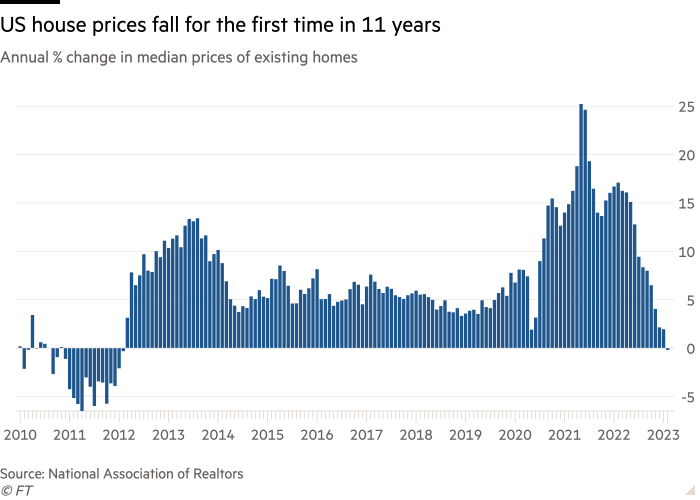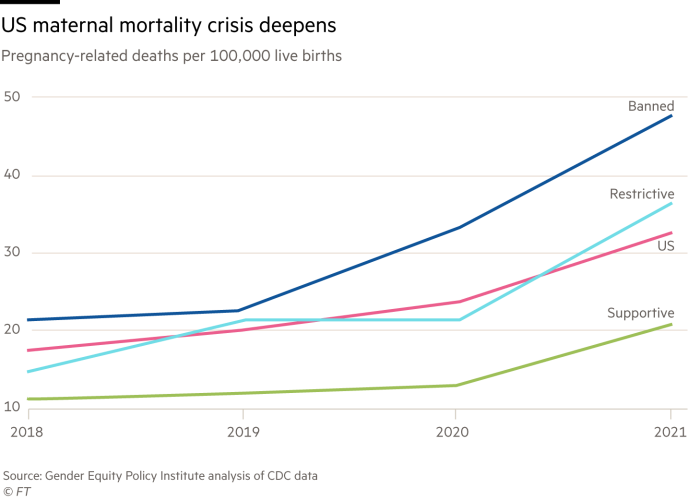
For the first time since 2001, US Democrats sympathise more with the Palestinians than the Israelis, in a sign that Americans’ views on the conflict have become more polarised.
Some 49 per cent of Democrats polled by Gallup said they sympathised more with the Palestinians versus 38 per cent for the Israelis, according to the pollster’s annual World Affairs report. More than three-quarters of Republicans said they sympathised more with Israel, compared to 11 per cent for Palestine.
“The escalation of Israeli-Palestinian hostilities over the past year, resulting in a high number of Palestinians killed, could partly explain the most recent shift in Democrats’ perspective,” Gallup said.
It added that Democrats’ “waning religiosity may be a factor in the longer-term trend” as those attending religious services weekly tended to be more sympathetic to the Israelis than those who do not.
Shotaro Tani
Our other charts of the week . . .

House prices in the US have fallen year-on-year for the first time in 11 years, dropping 0.2 per cent in February to $363,000 on average.
That is a 12.3 per cent fall from last year’s record of $413,800, which was recorded in June.
The US Federal Reserve’s drive to throttle inflation with steep interest rate rises has bruised the housing market by forcing mortgage rates higher. As a result, home sales have dropped by more than a fifth year-on-year.
Housing is one of the economic sectors most sensitive to rate rises because changes in the base rate of interest feed through into the cost of borrowing for mortgages.
Federica Cocco
Finland was the happiest country for the sixth year in a row, according to the UN’s latest World Happiness Report. The other Nordic countries all ranked within the top 10 as well.
The report noted that the Nordics “have higher levels of trust and of mutual respect and support” than other countries.
The ranking is based on answers to the main life evaluation question; a respondent is asked to think of a ladder, with the best possible life for them being a 10 and the worst being 0. They are then asked to rate their current lives on that scale.
The Nordics also ranked highly in terms of happiness equality — the difference in happiness between the most and least happy halves of the population.
Afghanistan was both the least happy country, and the one with the narrowest difference in happiness levels — meaning that discontent is widespread.
Shotaro Tani
Hit songs have been gradually getting shorter. In 2022, the top 100 songs ranked in the Billboard year-end chart averaged a length of 196.19 seconds (3 minutes and 16 seconds); a decade ago, the average was nearly 30 seconds longer.
This could partially be explained by the popularity of music streaming services. Streaming platforms typically pay rights holders based on the “stream share” — how much a rights holder’s music was played compared to the total streams in a given period. That may create incentives for musicians to produce shorter tracks, so their songs can be played as much as possible in the limited time listeners tune in.
The impact streaming services have had on music may also be driven by the algorithms. In 2019, Manchester-based music label Ostereo said: “More people skip before a song has ended and there’s a theory that streaming algorithms see this as a signal of dissatisfaction, which means the algorithm is less likely to recommend that song to other users, which means it is less likely to become popular.”
Shotaro Tani

Women in US states with abortion bans are 2.4 times more likely to die during pregnancy, childbirth or soon after giving birth than their counterparts in other states, according to a report by the Gender Equality and Policy Institute (GEPI).
GEPI classified states into three groups — supportive, restrictive and banned — based on their level of support for comprehensive reproductive healthcare, and then compared outcomes in the three groups over time.
It found that anti-abortion states tended to have poorer contraception coverage and provided inadequate sexual and reproductive health education to young people. A number of studies have found that higher rates of unintended pregnancies and restrictions on reproductive healthcare lead to worse health outcomes for infants and mothers.
The gap between mothers in states which have restrictive laws and those in which abortion is legal has been widening, GEPI said.
Maternal deaths have been increasing in the US since 1987, and now it has the highest rate of maternal mortality among wealthy nations.
In a separate report, the US Government Accountability Office found that excess maternal mortality in 2020 and 2021 was largely due to deaths from Covid-19. GEPI found there was “a substantial overlap between states that were reluctant to take Covid precautions and those that banned abortion or restricted reproductive healthcare access”.
Federica Cocco
Welcome to Datawatch — regular readers of the print edition of the Financial Times might recognise it from its weekday home on the front page.
Do you have thoughts on any of the charts featured this week — or any other data that has caught your eye in the past seven days? Let us know in the comments.
Keep up to date with the latest visual and data journalism from the Financial Times:
-
Data Points. The weekly column from the FT’s chief data reporter John Burn-Murdoch.
-
Climate Graphic of the Week is published every week on our Climate Capital hub page.
-
Sign up to The Climate Graphic: Explained newsletter, free for FT subscribers. Sent out every Sunday, a behind the scenes look at the most topical climate data of the week from our specialist climate reporting and data visualisation team.
-
Follow the Financial Times on Instagram for charts and visuals from significant stories.
-
Follow FT Data on Twitter for news graphics and data-driven stories from across the FT.